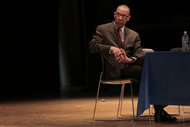
The Increasingly Desperate Dennis Walcott
In a scene reminiscent of George W. Bush’s desperate addresses to captive military audiences attempting to rationalize his criminal invasion of Iraq, NYC School Chancellor Dennis Walcott gave a transparently political speech to 1,100 principals and administrators in Brooklyn Tech High School urging them to continue implementing Mike Bloomberg’s disastrous education policies.
Walcott was responding to the rejection of Bloomberg’s failed and much loathed educational policies by Democratic candidates running for mayor.
Amidst his defense of Bloomberg’s indefensible policies at what was ostensibly a conference on education paid for by the public dime, Walcott, a longtime political appointee, added absurdly, “ I don’t like to involve myself in politics.”
Appropriately, this statement was greeted with laughter.
See article below from the NY Times
New York Schools Chief Warns Against Changes
By JAVIER C. HERNÁNDEZ
Published: May 18, 2013
Warning that the fate of New York City education was “hanging in the balance,” Dennis M. Walcott, the schools chancellor, suggested on Saturday that the school system was at risk of falling into disarray in the hands of a new mayor.
Mr. Walcott, in his latest salvo against the Democrats running for mayor, said city schools had reached a “new day” and that efforts to chip away at Mayor Michael R. Bloomberg’s 11-year reform effort were misguided.
“Halting the momentum of this extraordinary transformation would be a tragedy,” Mr. Walcott told an audience of more than 1,100 school administrators gathered for a conference at Brooklyn Technical High School.
The Democratic candidates for mayor have promised to reverse some of Mr. Bloomberg’s signature policies, including closing low-performing schools and providing space to charter schools. Those promises have caused distress in City Hall, though the Republican candidates have generally embraced the approach of Mr. Bloomberg, who leaves office at the end of the year.
Mr. Walcott’s speech seemed intended to be a rallying cry before a friendly crowd, but the response was muted. While his calls for preserving the authority of principals and eradicating nepotism were met with applause, some principals seemed uninterested in his message.
Laughter broke out in some corners after Mr. Walcott explained that he was not looking to be a kingmaker. “I don’t like to involve myself in politics,” he said.
Renel Piton, the principal of Brooklyn Lab School, said he shared Mr. Walcott’s concern about the candidates for mayor and did not want them to “gut reform for the sake of gutting.” Still, he said he was surprised the chancellor chose to use a speech at an academic conference to weigh in on a political battle.
“We need to focus on what’s going on in schools,” Mr. Piton said. “I don’t come on a Saturday to listen to their views on the candidates.”
Brian DeVale, principal of Public School 257 in Brooklyn, applauded when Mr. Walcott began discussing the old way of running schools, before the State Legislature handed the mayor authority over the school system in 2002. Mr. DeVale, an opponent of mayoral control, said he thought Mr. Bloomberg and Mr. Walcott were too authoritarian in their approach.
“I sat and listened to a political lecture from an administration I have no interest in,” Mr. DeVale, who is a union representative, said after the speech.
John C. Liu, the city comptroller and a Democratic contender for mayor, said he was puzzled by Mr. Walcott’s suggestion that the candidates were pandering to the teachers’ union.
“Candidates respond to complaints and concerns about the status quo,” Mr. Liu said in a telephone interview. “Candidates don’t manufacture concern.”
Even the Department of Education’s chief academic officer, Shael Polakow-Suransky, waded into the political fray, urging principals to support efforts to overhaul the school system.
Mr. Polakow-Suransky said he was so distraught by the attacks on the campaign trail that he called the chancellor of the Washington school system, Kaya Henderson, for advice.
In response, according to Mr. Polakow-Suransky, Ms. Henderson offered a variation on an African proverb: “The elephants are going to be fighting, but don’t forget to tend the grass.”









